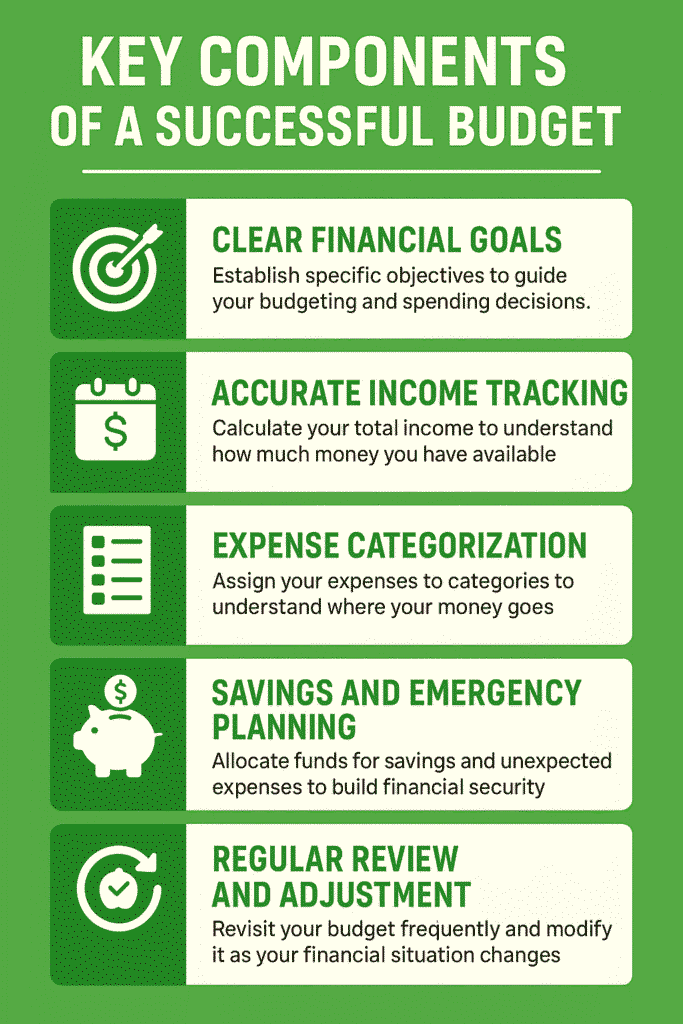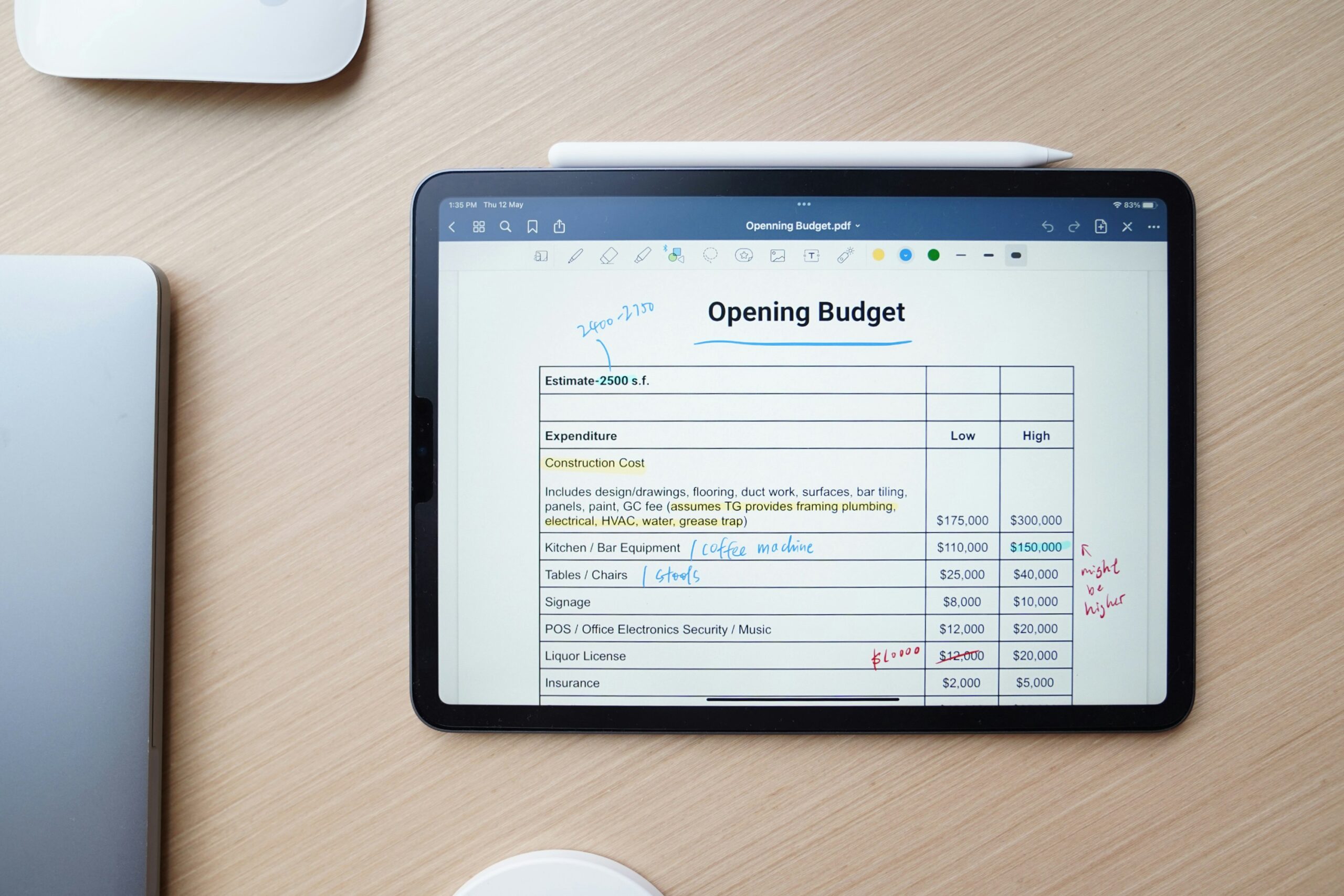Budgeting is one of the most powerful tools for taking control of your finances, yet many people either avoid it or give up too quickly because they don’t know how to structure one effectively. A budget is much more than just tracking expenses, it’s a comprehensive plan that helps you prioritize what truly matters, prepare for the unexpected, and work toward financial freedom. To be successful, every budget needs to include certain key components that make it practical, flexible, and sustainable. By focusing on these elements, you can create a budget that not only manages your day-to-day spending but also supports your long-term goals.

New to budgeting? Start with What Is a Budget: Understanding Budgeting.
1. Clear Financial Goals
A budget without goals is like driving without a destination, you may be moving, but you’re not sure where you’re headed. The most successful budgets start with clearly defined financial goals. These might include paying off credit card debt, building an emergency fund, saving for a down payment on a home, or setting aside money for retirement. When your goals are specific and measurable, they give your budget direction and purpose. For example, instead of just saying “I want to save money,” you might set a goal of saving $5,000 in one year for an emergency fund. These goals provide motivation, help you prioritize your spending, and make it easier to say no to unnecessary purchases that don’t align with what you’re working toward.
Learn how to set priorities with Pay Yourself First: What Is Reverse Budgeting & How To Do It.
2. Accurate Income Tracking
Before you can allocate money effectively, you need a complete picture of your income. This includes your salary after taxes, bonuses, side hustles, freelance work, or any other consistent sources of money. Too often, people underestimate or overlook smaller income streams, which can lead to inaccuracies in their budgets. By tracking every dollar coming in, you’ll know your exact financial capacity and avoid the trap of planning to spend more than you actually earn. Accurate income tracking is also essential if your earnings fluctuate from month to month, as it allows you to create an average and adjust your budget realistically. The clearer you are about your income, the stronger the foundation your budget will have.
If your income isn’t steady, read Tips On How To Budget With Irregular Income.
3. Expense Categorization
Knowing where your money goes is just as important as knowing how much you earn. That’s why expense categorization is a crucial part of successful budgeting. Start by breaking your expenses into two main groups: fixed and variable. Fixed expenses include predictable costs like rent or mortgage payments, utilities, insurance, and loan repayments. Variable expenses, on the other hand, cover things like groceries, entertainment, clothing, dining out, and personal care. By separating expenses into categories, you’ll see patterns in your spending and identify areas where you might be overspending. This also allows you to allocate money more intentionally, for example, capping dining out at $150 a month and adjusting other categories to free up more for savings or debt repayment.
A helpful method to simplify this is Budgeting Basics: What Is The 50/30/20 Budget Rule.
4. Savings and Emergency Planning
A strong budget isn’t just about covering today’s bills, it also makes room for tomorrow’s needs. That’s why savings and emergency planning are vital components. Building savings ensures you have money for long-term goals such as retirement, buying a home, or funding education. At the same time, setting aside money for emergencies protects you from unexpected costs like car repairs, medical bills, or job loss. Even if you can only save a small amount each month, consistency matters more than size. Over time, these contributions add up, giving you peace of mind and financial resilience. Treat savings like a non-negotiable expense in your budget, just as important as rent or groceries, and automate the process whenever possible to stay consistent.
Start preparing with What’s An Emergency Fund And How To Build One.
5. Regular Review and Adjustment
No budget is perfect forever. Your income, expenses, and goals will naturally change over time, and your budget should adapt with them. That’s why regularly reviewing and adjusting your budget is the final key component of success. Aim to revisit your budget at least once a month to track your progress, check for overspending, and make adjustments where needed. For example, if your grocery spending is consistently higher than planned, you might raise that category and reduce another area, like entertainment. Major life changes such as a new job, marriage, or having children also require a complete review of your budget. By keeping your budget flexible and up-to-date, you’ll ensure it always reflects your current reality and continues to support your financial goals.
For a structured process, see Monthly Budgeting Made Easy: Step-by-Step Guide.
Summary
The five key components of successful budgeting, clear goals, accurate income tracking, expense categorization, savings and emergency planning, and regular review, work together to create a strong, flexible financial plan. When applied consistently, these elements help you gain control over your money, reduce stress, and make progress toward the future you want. A budget isn’t about restriction, it’s about clarity and confidence. By building yours around these components, you’ll have a reliable roadmap that supports both your daily needs and your long-term financial success.
Avoid pitfalls by checking 5 Common Budgeting Mistakes To Avoid.
FAQs
How detailed should my budget be?
It depends on your personality and needs. Some people prefer tracking every single purchase, while others use broader categories. The right level of detail is the one you’ll actually stick with consistently.
How do I stay motivated to follow my budget?
Tie your budget to clear, meaningful goals, like paying off debt or saving for a vacation, and track your progress visually. Celebrating small milestones keeps motivation high.
What should I do if I constantly overspend in one category?
First, review if the category is unrealistic and adjust it if needed. If not, set limits like using cash envelopes, alerts from your bank, or reducing discretionary spending in other areas to balance it out.
Is it okay if my budget changes every month?
Yes. Budgets should be flexible. Some months bring extra expenses, like holidays, birthdays, or car repairs. Adjusting as needed is a sign of a healthy budget, not a failed one.
Can I budget if my income is irregular?
Absolutely. Start by calculating your lowest reliable monthly income, and build your budget around that. Use extra income from busier months to save, pay down debt, or cover future shortfalls.
What tools can I use to make budgeting easier?
Free budgeting apps, spreadsheets, or even pen and paper can all work. The best tool is the one that makes tracking and reviewing simple enough that you’ll keep using it.
How long does it take to see results from budgeting?
You’ll usually notice improvements in just a month or two, like fewer surprises and more awareness of where your money goes. Bigger results, like debt payoff or savings growth, build steadily over time.

